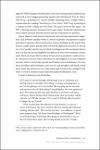Of Ice Cream, Potatoes, and Kimono-Clad Japanese Women: Forgetting and Remembering the Japanese Racialization of Lethbridge’s Sensuous Geographies
| dc.contributor.author | Aoki, D | |
| dc.contributor.author | Adams, C | |
| dc.contributor.editor | Hodes C | |
| dc.contributor.editor | Bonaficio G | |
| dc.date.accessioned | 2023-10-03T09:02:50Z | |
| dc.date.available | 2023-10-03T09:02:50Z | |
| dc.date.issued | 2023-06-01 | |
| dc.identifier.isbn | 978-1-77829-000-8 | |
| dc.identifier.other | 7 | |
| dc.identifier.uri | https://pearl.plymouth.ac.uk/handle/10026.1/21351 | |
| dc.description.abstract |
‘There was quite a bit of…discrimination…it’s the way we were treated and what we were called, today, won’t be acceptable’ [0:30:00] ‘No, we didn’t have any discrimination…We’re all Canadians and that’s it’ [1:04:00] The above excerpts, from an oral history interview with Peter conducted on 17 November 2017, reveal how racial identities and consciousness as well as processes of racialization – including Canadianization – and racism are inherently unstable, always in tension even as an utterance seems to align concretely with experience, feeling, and value at different moments as one remembers and engages with one’s past. In this chapter, we draw on a montage of memories from oral histories conducted in and around Lethbridge between 2011-2019 with second and third generation Japanese Canadians who identify Lethbridge and area as their home. The Japanese population in southern Alberta increased sevenfold in a matter of a few months from a few hundred to some four-thousand, as a result of multiple forced mass wartime dislocations and dispossessions, a ‘crime against humanity’ that reveals the extent of institutionalised racialised and eugenic violence in Canada’s twentieth-century nation-building process (Oikawa, 2012). We invite readers to question how Japanese went from being categorised as a ‘yellow peril’ and ‘enemy aliens’ (Mackenzie King 1944), to being the most assimilated of all visible ethnic minorities in Canada (Omatsu 2013, Sunahara 1981, Adachi 1976, Makabe 1980) while considering processes of engagement, reflection, and contradiction in oral history (see Sugiman 2013, Adams 2012). To do this, we will focus on two topics: Cultures and Strategies to (Self-) Exonerate Racism – the apparent sea-change after 1945 in attitudes towards the Japanese across Canada is remarkable for its near-sudden and near-total occurrence (Roy 2007, Bangarth 2008). This is reflected in press primary-sources as well as oral histories. While many Japanese themselves seem to corroborate this story in their memories, this topic invites readers to identify the many strategic forms utterance may take, particularly when silences are also considered. Indeed, as the two quotations above suggest, a range of contradictory impulses may be at play: distance from and closeness to feelings from the past, a desire to share in a navigation of diplomatic deflection, changing perceptions of the listener and her/his imagined wider audiences, an engagement with oneself across time – the present generating the past in self-reflection and moral narration on the one hand, and posterity-influencing occlusion and deception. Lethbridge as a paradise of racial harmony – with the dismantling of official infrastructure and systems of racist state violence against the Japanese in 1949, racism changed its form with micro-aggressions exerting a powerful if seemingly innocuous and nearly-imperceptible influence shaping the lives of many individuals’ we’ve spoken with, and in turn, colouring the racial milieu of Lethbridge. This topic will invite readers to interrogate the historical transformation of racism in the city as well as the often uncritically-deployed liberal understanding of progress that underwrites this narrative. | |
| dc.format.extent | 153-170 | |
| dc.publisher | University of Athabasca Press | |
| dc.relation.ispartof | Racism in Southern Alberta and Anti-Racist Activism For Change | |
| dc.title | Of Ice Cream, Potatoes, and Kimono-Clad Japanese Women: Forgetting and Remembering the Japanese Racialization of Lethbridge’s Sensuous Geographies | |
| dc.type | chapter | |
| plymouth.organisational-group | |Plymouth | |
| plymouth.organisational-group | |Plymouth|Faculty of Arts, Humanities and Business | |
| plymouth.organisational-group | |Plymouth|REF 2021 Researchers by UoA | |
| plymouth.organisational-group | |Plymouth|Users by role | |
| plymouth.organisational-group | |Plymouth|Users by role|Academics | |
| plymouth.organisational-group | |Plymouth|REF 2021 Researchers by UoA|UoA28 History | |
| plymouth.organisational-group | |Plymouth|Faculty of Arts, Humanities and Business|School of Society and Culture | |
| dc.date.updated | 2023-10-03T09:02:49Z | |
| dc.rights.embargodate | 2024-3-12 | |
| dc.rights.embargoperiod |


